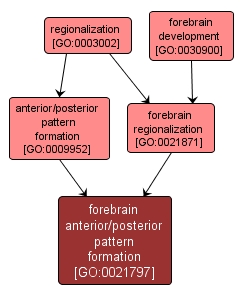GO TERM SUMMARY
|
| Name: |
forebrain anterior/posterior pattern formation |
| Acc: |
GO:0021797 |
| Aspect: |
Biological Process |
| Desc: |
The creation of specific areas of progenitor domains along the anterior-posterior axis of the developing forebrain. |
Synonyms:
- forebrain anterior-posterior pattern formation
|
|

|
INTERACTIVE GO GRAPH
|














